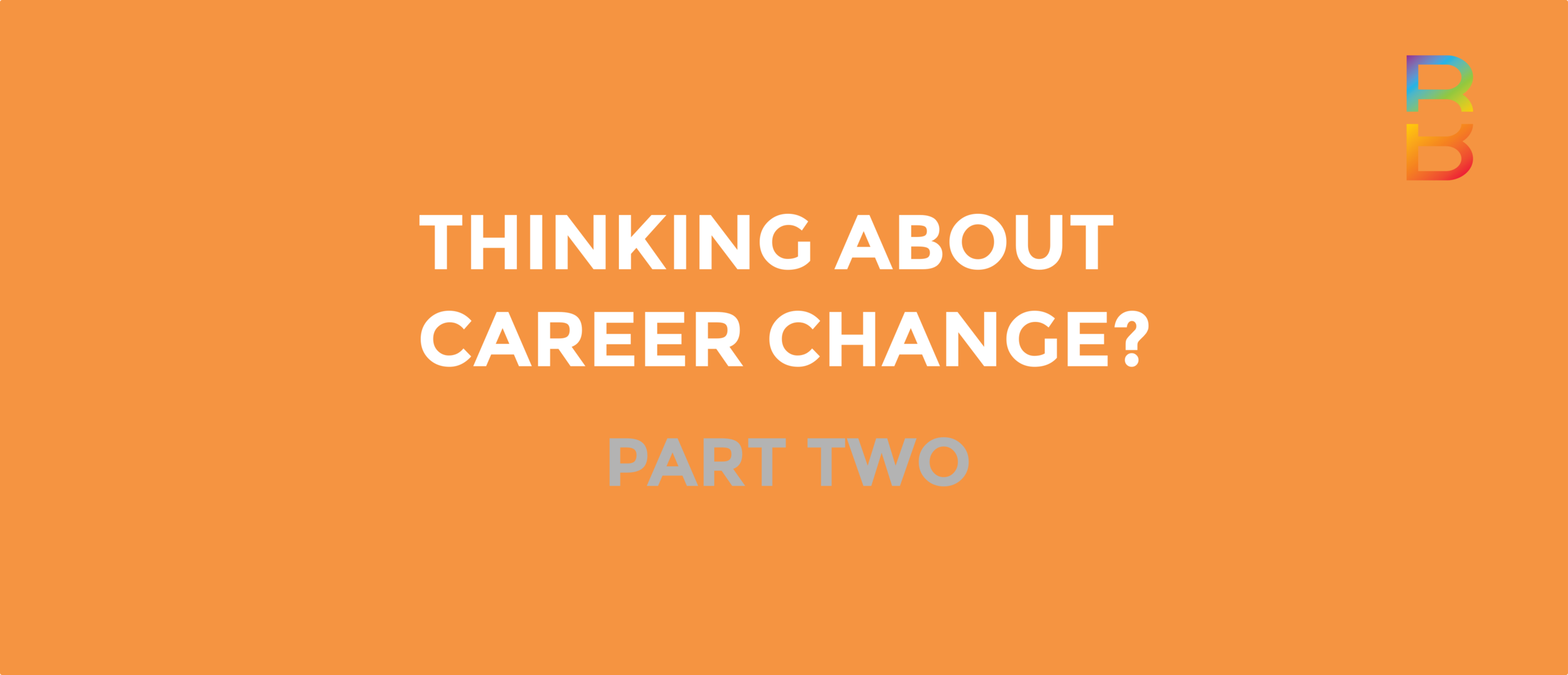Still waking up with a feeling of anxiety or dread about going into work? Having ongoing uncertainty around returning to work, after taking some time off? If the answer is yes, grab yourself a cuppa, find a comfortable spot and read on - this article should be right up your street.
In my last blog we discovered that almost half of all workers in the UK (47%) would like to change career. Not all make the switch because they are apprehensive about making it. The main reasons are due to a lack of financial security, uncertainty on what to switch to and fear of failure.
If you are undecided about a career change and share some of these worries, here’s some advice to help you make your mind up.
First understand the initial strength and nature of your motivation for career change. Moving to another profession can be hard work. It can involve significant time and effort to learn new skills and gain the required knowledge to make the move. There are also financial implications that need considering. Reflect on your motivations and identify the potential benefits from making the switch. This will reduce the possibility of making an impetuous job move. Exercise 1 can help you identify and understand your motivations.
When considering a career change, one of the hardest things is knowing what work to do instead - career confusion sets in. Many of us find ourselves in a state of limbo between our current work and the promise of a dream job. Often this level of uncertainty leads to a lack of motivation to act. The idea goes on the metaphorical back burner and we make remarks like ‘better the devil you know’ or ‘I’m probably better off staying put’. The difficulty comes when our unconscious minds are telling us something different.
When our conscious and unconscious minds are in conflict, we can threaten our mental health and well-being. Persistent conflict can cause serious health conditions like depression, long-term stress and anxiety.
If you are regularly thinking about career change, have been for a while and are yet to reach a decision, you are in conflict. Get clarity on your career purpose to help you decide what you want to do.
Our individual motivations and career purpose often differ. The right career for you may not be right one for someone else. We all have our own unique set of values, beliefs, knowledge, abilities and desires. Spend some time thinking about what's important to you in your work. Get to know yourself better and explore potential career alternatives. Explore fears and uncertainty without risk. Identify your true work purpose before taking the plunge and then plan what you need to do to make a successful career transition. Exercise 2 can help you get clarity on your career purpose
There is only one way to get financial certainty and that is to plan for it. Having enough savings to finance a career move means you can take more immediate risks. Yet one in four Brits have no savings. The average consumer debt per household in 2019, has also reached over fifteen thousand pounds. This means an uncalculated risk is most definitely not an option for most people. To achieve our dreams and aspirations we all need financial stability. Often, we think we need to sacrifice one for the other and this can stop us from exploring our options further. There is no getting away from the fact that sometimes we do not have the immediate means to finance a career move.
This should not stop us from fulfilling our dreams. Think about taking a more gradual approach.
Whether you are on minimum wage or earning more, you can find ways to reduce the money that goes out. If you are thinking of going into business yourself and personal savings is not an option, get help. You could get a small business loan, find a business angel or even consider crowd funding. If you feel out of your depth, consider getting independent professional financial advice. You can also seek further guidance from your local Citizens Advice Bureau. Certainty around financial security can be achieved within several months. Prepare to plan for a longer period though if you need to re-train and want to maintain earning status. When the commitment is greater, belief in your dream is fundamental. Sometimes we need to cut back, stop doing or change the way we live for a while, to get what we really, really want. Exercise 3 can help you plan for financial certainty
We all have an inbuilt fear response to a threat of physical or emotional danger. At one time our ancestors experienced many threats to human life which often led to life or death consequences. Today, the stakes are much lower. Yet our minds still treat the threat as significant and the response is fear. In the context of career change, we also assess threats and if we see danger, we become fearful. Often fear of failure, loss of status or not being good enough stop us. Fear of regretting the decision, starting again and even success can also hold us back. An ongoing internal dialogue of self-doubt ensues and we talk ourselves out of trying something new. Our ‘fight, flight or freeze’ response kicks in. We decide either to make an impulsive career move, stay put or have a prolonged state of indecision. None of which may end up being resourceful to us in the long run. Obstacles get in our way and we are the ones responsible for putting them there.
Most of the people I have talked to, who have made a forced or unforced career change, have done so, with a degree of fear. I can also attest to this from my own experiences. To completely eradicate fear is unrealistic. Mitigating the perceived threats or risks that create fear is a more pragmatic approach. When we plan and set ourselves goals, we are more in control of and confident about the decisions we make. When we identify and mitigate risks, we remove potential obstacles that stand in our way. Fear and uncertainty start to fade, and we become more willing to try something new. Planning well for a career change can help you find the courage to make the transition.
To become more fearless, plan for it as if it has happened. This takes you beyond theoretical planning to somewhere between your current job and your dream job. The idea is to get experience in your chosen career before making a permanent move. It can involve a temporary work placement, secondment, day-release or doing other work in your own time. This way you can get ‘on the job’ experience at the same time as protecting your existing employment. Although the full transition has not yet happened, you will get a better feel for the job you are interested in. Whether you are employed or run your own business make time to explore new possibilities. It can reduce fears associated with a career move.
Even though planning is a great way to help us develop confidence about making a career change, some fears are more deep-rooted. They can relate to a significant event that has happened in our past. We can do something about this too. By getting in touch with our unconscious mind, we can re-programme our thinking. All our learning and behaviour change occurs in the unconscious mind. This means almost every human being on the planet has the capacity to re-programme the way they think about things. One way to do this is to visualise a detailed image having already made the successful career change. One where you have conquered the fear. By keeping it fresh in your mind, your subconscious accepts your image as reality. It then works to make sure you achieve it. Successful people like Oprah Winfrey, Arnold Swarzenegger and Lindsey Vonn all practice visualisation.Exercise 4 can help you become more fearless.
Positive affirmations, mantras or auto-suggestions, designed to overcome a fear, can also be useful. Try to see the journey as an adventure, something you want to explore to see what will happen. There are no certainties in life so prepare yourself to approach change in a more flexible way. One that keeps you open to adapt to new possibilities along the way - that’s what Paula did.
Paula Ellis grew up in Old Swan, an inner-city area of Liverpool. After a successful work placement at Liverpool Housing Trust, she went on to work in social housing and customer services management for over 30 years. Eventually, the reduction of social value related services led to an organisational restructure. Her role, along with some other posts, were made redundant. In her mid-forties, she was forced to re-consider her employment options.
Instead of being defeated by the situation, she chose to think of the event as an opportunity. She explored different ways she could help improve public services for the people of the Liverpool City Region. In 2012, she set up and still runs a local community interest company with her business partner. They have since been successful in bidding for and securing local funding to help young people from complex backgrounds to improve their personal skills in areas such as self-esteem, confidence, resilience and decision making. Since being made redundant, her company has provided freelance opportunities with the Liverpool City Council, local Parish Councils and the Homes and Communities Agency. She has also been a School Governor at St Alberts School in Knowsley and The Belvedere Academy in Liverpool.
Paula now works in public transport for the Liverpool City Region Combined Authority, as the Corporate Engagement Manager. Whilst some of her career moves were triggered by events out with her control, she has gone on to have a more diverse work experience and gain greater personal benefits like flexible and agile working, higher salary and significant personal development across several public sectors. She told me, ‘if you are willing to try and put the effort in, you can succeed at most things.’
Career change is ultimately about getting more of what you want out of life.
What's the absolute worst than can happen if you change your career? You may not like your new job and want to change careers again or even go back to your old career. Well you will already have experience at doing the former. In the latter case you are no worse off than you were before. In fact, you will have gained more valuable knowledge, experience and skills to help you with all your future adventures.
What’s the absolute best that can happen if you change your career? You find the job of your dreams and go to work, for the most part, feeling truly fulfilled.
Acknowledgements
Massive thanks to Paula Ellis for sharing her story with me and giving me permission to share it with you.
Contact
I would love to hear from you if you have an interesting career change story or want to find out more about my Growth Plans.
Email kate@rootball.co.uk or call 07759 652357. Hope you found this article useful.
© Kate Halewood, Rootball Coaching and Consultancy Ltd
















